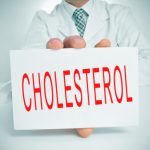 A recent study shows that your good cholesterol level (HDL) is affected by gut bacteria which can make it more difficult to maintain heart health. The bacteria that is living in your gut can actually have an impact on your weight, cholesterol level, and body fat; all of these factors affect the health of your heart.
A recent study shows that your good cholesterol level (HDL) is affected by gut bacteria which can make it more difficult to maintain heart health. The bacteria that is living in your gut can actually have an impact on your weight, cholesterol level, and body fat; all of these factors affect the health of your heart.
The research was recently published in the journal American Heart Association, as well as Circulation Research.
Advertisement
Human beings and microbes, including bacteria, have an interdependent relationship. Our bodies have trillions of these microbes – or microorganisms – which is ten times the amount of human cells in our body. They aid in digestion and help our immune systems and play a vital role in our health.
Jingyuan Fu, Ph.D., study lead author and associate professor of genetics at University Medical Center Groningen in the Netherlands, said “Our study provides new evidence that microbes in the gut are strongly linked to the blood level of HDL (good cholesterol) and triglycerides and may be added as a new risk factor for abnormal blood lipids, in addition to age, gender, BMI and genetics.”
For the purposes of the study, the team of researchers used modern sequencing technology to study the link between our gut microbes and the blood lipid levels of 893 participants from the Netherlands. They found new evidence that there are 34 variant types of bacteria that effect differences in BMI (body fat), blood lipids (like triglycerides) and good cholesterol HDL (high-density lipoprotein). The gut bacteria accounted for 4.6 percent difference in BMI, six percent difference in blood lipids and four percent difference in good cholesterol levels; however, the researchers were surprised by the lack of connection between bad cholesterol levels (LDL) and the gut bacteria.
The team of researchers hope their recent discovery might open doors to therapies that can change the way gut bacteria contributes and effects BMI, cholesterol and fat (blood lipids), in order to help prevent heart disease. “We also hope our findings inspire microbiologists to continue to research the function of these bacteria and their specific role in the regulation of lipid metabolism,” Fu added.
Cholesterol levels and their effect on the heart
 Gut bacteria is just one influence on cholesterol and heart health. We all know that cholesterol can affect our overall health. Maintaining control of your cholesterol levels will help decrease your risk of heart disease and stroke. To better understand how to control your levels, first you need to be tested to find out your cholesterol numbers.
Gut bacteria is just one influence on cholesterol and heart health. We all know that cholesterol can affect our overall health. Maintaining control of your cholesterol levels will help decrease your risk of heart disease and stroke. To better understand how to control your levels, first you need to be tested to find out your cholesterol numbers.
According to the American Heart Association, adults over the age of 20 should have their cholesterol levels tested every four to six years. The check-up can also inform you of other risk factors (like age, smoking, high blood pressure and family history) that affect your risk of stroke or heart attack in the short-term or long-term. Your cholesterol levels are measured in milligrams per deciliter (mg/dL) of blood.
From the test you will learn about your:
- Total blood cholesterol – calculated by adding HDL to LDL, plus 20 percent of your triglyceride level
- HDL, or good cholesterol – higher levels are better. Smoking, high BMI, lack of exercise and type-2 diabetes can all contribute to a low HDL.
- LDL, or bad cholesterol – low levels are better for your health. Eating food rich in saturated and trans fats increase LDL.
- Triglycerides – this is the most common type of fat found in the body. High levels are linked to atherosclerosis which contributes to risk of heart disease and stroke.
If you are not sure what the difference is between HDL and LDL, now is the time to find out more, to help you decrease your negative health risks.
Good Cholesterol (HDL) vs Bad Cholesterol (LDL)
Cholesterol is unable to dissolve in the bloodstream. It is instead moved through the blood by lipoproteins. The two types of lipoprotein are LDL (low-density lipoprotein) and HDL (high-density lipoprotein). They carry the cholesterol between cells in your body.
Here are the differences between bad cholesterol and good cholesterol:
HDL – GOOD
- Helps remove bad cholesterol (LDL) from your arteries
- Takes LDL back to your liver where it can be broken down and removed from the body
- Can protect you from heart attack and stroke
LDL – BAD
- Can contribute to plaque (thick, hard deposit which clogs arteries and causes atherosclerosis)
- Can form clots, blockages and narrow the arteries, resulting in heart attack and stroke
- When plague decreases blood supply to your legs, peripheral artery disease can occur
Due to the damage caused by LDL, it is important to understand how you can boost good cholesterol levels and maintain heart health.
How to boost good cholesterol levels for healthy heart
Advertisement
 Luckily, making even small changes to your daily routine and lifestyle can positively impact your health. Here are a few changes to start making immediately to influence your HDL levels:
Luckily, making even small changes to your daily routine and lifestyle can positively impact your health. Here are a few changes to start making immediately to influence your HDL levels:
- Quit smoking, or don’t smoke – Giving up smoking can increase your good cholesterol by 10 percent. If you need help, ask your doctor about your options.
- Weight loss – If your BMI is over 25, losing a few pounds can impact your good cholesterol levels. Regular exercise can help you achieve your weight goal.
- Exercise regularly – Regular exercise can increase good cholesterol levels by up to 5 percent in just two months. Brisk exercise, such as walking, swimming, cycling, gardening and running, can increase your heart rate. Try brisk exercise for 30 minutes or in three 10-minute intervals.
 Eat healthy – Only 25 to 35 percent of your daily calories should come from fat. However, you should avoid saturated and trans fats because they raise bad cholesterol levels. Try polyunsaturated and monounsaturated fats instead, which can be found in peanut, canola and olive oils. Omega-3 fatty acids are also beneficial and can be found in nuts and fish.
Eat healthy – Only 25 to 35 percent of your daily calories should come from fat. However, you should avoid saturated and trans fats because they raise bad cholesterol levels. Try polyunsaturated and monounsaturated fats instead, which can be found in peanut, canola and olive oils. Omega-3 fatty acids are also beneficial and can be found in nuts and fish.- Moderate alcohol consumption – Basically, just drink less. Moderate amounts of alcohol are actually linked with high levels of good cholesterol. Women should only have one drink each day, while men should have no more than two.
Here are a few foods that will help increase good cholesterol:
 Whole grains
Whole grains- Oatmeal
- Walnuts
- Almonds
- Flaxseeds
- Fatty fish
- Fish oil
- Fruits and Vegetables
Along with cholesterol, having a health BMI and a strong immune system can also help decrease your risk of heart disease and stroke and improve your overall heart health. Take the necessary precautions to understand your cholesterol numbers and prevent heart disease. Speak with your healthcare practitioner about how to test your cholesterol levels and learn your risks.
